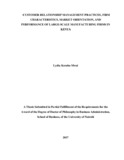| dc.description.abstract | Given that the environment under which businesses operate have become more turbulent, the key issue the firms face is no longer simply about providing good quality products or services, but also retaining loyal customers who will contribute to long-term revenue to the firm. Customer Relationship Management as a business strategy identifies, cultivates and maintains long-term profitable relationships. The study therefore sought to explore the influence of CRM practices on performance of large-scale manufacturing firms in Kenya. The broad objective of this research was to establish the influence of customer relationship management Practices, firm characteristics and market orientation on performance of large-scale manufacturing firms in Kenya. Specific objectives focused on examining the moderation effects of firm characteristics and market orientation on the relationship between CRM practices and firm performance and establishing the joint effect of the three variables on performance. The study was guided by the positivist approach. Four hypotheses were formulated and tested through regression analysis. The study was anchored on three theories: resource advantage, relationship marketing and dynamic capabilities theories. The population of the study comprised large-scale manufacturing firms that were members of the Kenya Association of Manufacturers (KAM). A descriptive cross-sectional survey was used. Primary data was obtained using a structured questionnaire. The target population consisted of 225 large-scale manufacturing firms. Stratified random sampling was used. Data was analyzed through descriptive statistics, factor analysis and regression analysis. Results of Cronbach’s Alpha test ranged from 0.842 to 0.880 and this confirmed the reliability of all the measurement scales used in the study. Results revealed that CRM practices and organizational performance had a statistically significant relationship at F=4.824 with P-value =.031. The results also revealed that market orientation was a strong statistical predictor of firm performance. It was also established that firm characteristics had a weak influence on firm performance compared to CRM practices and market orientation. In addition, the moderating effect of market orientation on the association between CRM practices and organizational performance was found to be statistically significant (F=9.138, P-value<0.05). The moderating influence of firm characteristics on the relationship between CRM practices and firm performance was also found to be statistically significant (F=30.797, P-value <0.05). The study elucidated the strength of market orientation on firm performance (β=0.600). Furthermore, the study supported findings of previous studies on the influence of CRM practices on firm performance. The outcomes of the investigations revealed that the joint effect of CRM practices, firm characteristics and market orientation on firm performance was statistically significant (F=10.053, P-value=.002). In addition, the study found that all variables had a positive and significant influence on performance. Further, the findings of the study support the theoretical link between CRM practices, firm characteristics, market orientation and performance. The results present varied inferences for policy and practice. Policy makers will use the findings of this study to come up with deliberate measures that will be aimed at enhancing customer centric strategies so as to ensure manufacturing firms are able to cater for the changing expectations of their customers. Customer relationship management practitioners will use the findings of this study to support the development of CRM practices and investing in market oriented strategies as they are more likely to yield better performance outcomes. Future researchers should consider using longitudinal research design to reexamine the changes in CRM practices and firm performance over time. In addition, forthcoming researchers should consider combining qualitative and quantitative study designs. Further, to include the views of customers about CRM practices, future studies need to sample respondents from both internal and external sources. | en_US |



